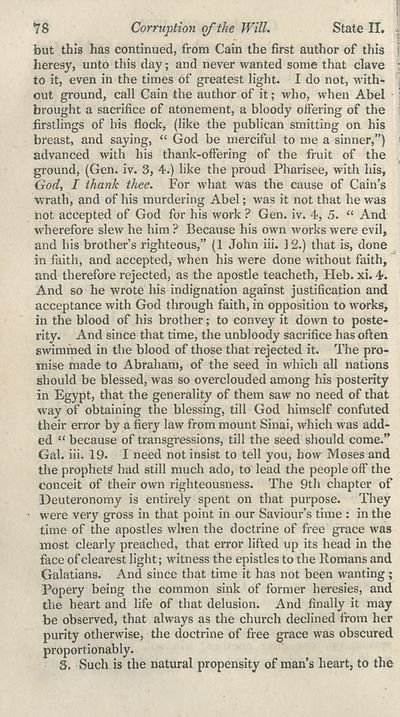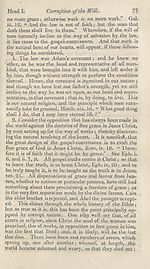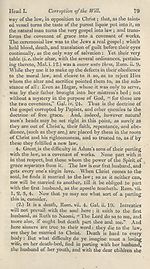Download files
Complete book:
Individual page:
Thumbnail gallery: Grid view | List view

*78 Corruption of the Will. State II. j
but this has continued, from Cain the first author of this i
heresy, unto this day; and never wanted some that clave
to it, even in the times of greatest light. I do not, with¬
out ground, call Cain the author of it; who, when Abel
brought a sacrifice of atonement, a bloody offering of the
firstlings of his flock, (like the publican smitting on his
breast, and saying, “ God be merciful to me a sinner,”)
advanced with his thank-offering of the fruit of the
ground, (Gen. iv. 3, 4.) like the proud Pharisee, with his,
God, I thank thee. For what was the cause of Cain’s
■wrath, and of his murdering Abel; was it not that he was
not accepted of God for his work ? Gen. iv. 4, 5. “ And
wherefore slew he him ? Because his own works were evil,
and his brother’s righteous,” (1 John iii. 12.) that is, done
in faith, and accepted, when his were done without faith,
and therefore rejected, as the apostle teacheth, Heb. xi. 4.
And so he wrote his indignation against justification and
acceptance with God through faith, in opposition to works,
in the blood of his brother; to convey it down to poste¬
rity. And since that time, the unbloody sacrifice has often
swimmed in the blood of those that rejected it. The pro¬
mise made to Abraham, of the seed in which all nations
should be blessed, was so overclouded among his posterity
in Egypt, that the generality of them saw no need of that
way of obtaining the blessing, till God himself confuted
their error by a fiery law from mount Sinai, which was add¬
ed “ because of transgressions, till the seed should come.”
Gal. iii. 19. I need not insist to tell you, how Moses and
the prophets had still much ado, to lead the people off the
conceit of their own righteousness. The 9th chapter of
Deuteronomy is entirely spent on that purpose. They
were very gross in that point in our Saviour’s time : in the
time of the apostles when the doctrine of free grace was
most clearly preached, that error lifted up its head in the
face of clearest light; witness the epistles to the Romans and
Galatians. And since that time it has not been wanting;
Popery being the common sink of former heresies, and
the heart and life of that delusion. And finally it may
be observed, that always as the church declined from her
purity otherwise, the doctrine of free grace was obscured
proportionably.
3. Such is the natural propensity of man’s heart, to the
but this has continued, from Cain the first author of this i
heresy, unto this day; and never wanted some that clave
to it, even in the times of greatest light. I do not, with¬
out ground, call Cain the author of it; who, when Abel
brought a sacrifice of atonement, a bloody offering of the
firstlings of his flock, (like the publican smitting on his
breast, and saying, “ God be merciful to me a sinner,”)
advanced with his thank-offering of the fruit of the
ground, (Gen. iv. 3, 4.) like the proud Pharisee, with his,
God, I thank thee. For what was the cause of Cain’s
■wrath, and of his murdering Abel; was it not that he was
not accepted of God for his work ? Gen. iv. 4, 5. “ And
wherefore slew he him ? Because his own works were evil,
and his brother’s righteous,” (1 John iii. 12.) that is, done
in faith, and accepted, when his were done without faith,
and therefore rejected, as the apostle teacheth, Heb. xi. 4.
And so he wrote his indignation against justification and
acceptance with God through faith, in opposition to works,
in the blood of his brother; to convey it down to poste¬
rity. And since that time, the unbloody sacrifice has often
swimmed in the blood of those that rejected it. The pro¬
mise made to Abraham, of the seed in which all nations
should be blessed, was so overclouded among his posterity
in Egypt, that the generality of them saw no need of that
way of obtaining the blessing, till God himself confuted
their error by a fiery law from mount Sinai, which was add¬
ed “ because of transgressions, till the seed should come.”
Gal. iii. 19. I need not insist to tell you, how Moses and
the prophets had still much ado, to lead the people off the
conceit of their own righteousness. The 9th chapter of
Deuteronomy is entirely spent on that purpose. They
were very gross in that point in our Saviour’s time : in the
time of the apostles when the doctrine of free grace was
most clearly preached, that error lifted up its head in the
face of clearest light; witness the epistles to the Romans and
Galatians. And since that time it has not been wanting;
Popery being the common sink of former heresies, and
the heart and life of that delusion. And finally it may
be observed, that always as the church declined from her
purity otherwise, the doctrine of free grace was obscured
proportionably.
3. Such is the natural propensity of man’s heart, to the
Set display mode to:
![]() Universal Viewer |
Universal Viewer | ![]() Mirador |
Large image | Transcription
Mirador |
Large image | Transcription
| Antiquarian books of Scotland > Religion & morality > Human nature in its fourfold state > (96) |
|---|
| Permanent URL | https://digital.nls.uk/118584848 |
|---|
| Description | Thousands of printed books from the Antiquarian Books of Scotland collection which dates from 1641 to the 1980s. The collection consists of 14,800 books which were published in Scotland or have a Scottish connection, e.g. through the author, printer or owner. Subjects covered include sport, education, diseases, adventure, occupations, Jacobites, politics and religion. Among the 29 languages represented are English, Gaelic, Italian, French, Russian and Swedish. |
|---|

